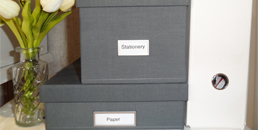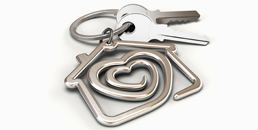by Natalie Morey | Oct 25, 2012 | Declutter tips, Home Organisation, Tips
Get Organised For Christmas
As a professional organiser, I love nothing more than planning for my Christmas. I started my Christmas shopping several months ago. I am always thinking about gifts that I can buy family and friends and great recipes that I can try. Now, I understand that not all people are that way inclined, so I have listed below some tips to help you start planning for the big day.
With only nine weeks to go before the big day, it’s time to start getting organised for Christmas. You can avoid the traffic mayhem, the parking challenges, the frustration of finding out that the perfect gift you wanted to buy is sold out by a little forward planning.
Christmas Organising
So with only 9 weeks to go until Christmas, the first thing I wanted to focus on is getting the house in order for all those extra guests or parties that you will be having.
First, review what maintenance needs to be done around the house like painting, repairs, pictures to be hung and those small annoying little maintenance issues etc. As it gets closer to Christmas it gets harder to get a good handyman or builder as they are all booked out, so book your handyman now.
Christmas Spring Cleaning
Secondly, if you have not finished your spring cleaning, now is the perfect time to finish it off. Now is the time to:
- Wash the windows inside and outside
- Get the carpet, blinds, sofa’s and upholstery cleaned
- Tidy up the garden
Decluttering The Spare Room
Thirdly, now is the perfect time to get the spare room organised. You can purchase some really nifty storage solutions that will look great in the spare room, whilst providing the perfect storage solution to contain all the clutter.
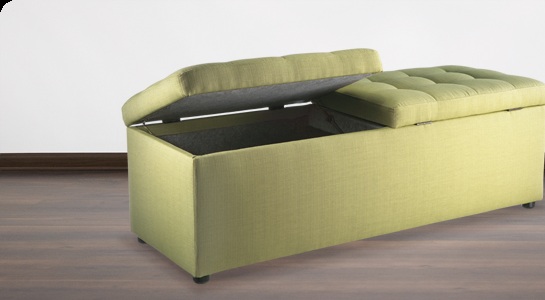
Image: from http://www.plush.com.au
Whether it is a computer cupboard that contains all the papers and mess, a storage bench, a fold-up bed that comes out from the wall or an ottoman that doubles as a pull out bed, you can find some versatile storage solutions.
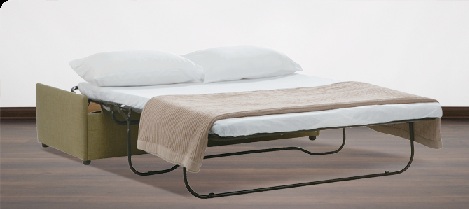
Image: from http://www.plush.com.au
Perhaps you might need to purchase new linen, doona covers, pillows or matching towels. Plan to purchase these items soon, rather than the week before Christmas, when stock levels are low.
Now, look at what items are cluttering up the room. Think about the things and decide what should be thrown out, what can be donated to charity and what can be sold on eBay. If you plan your declutter well, find out when your next hard rubbish waste collection is and get rid of any unwanted furniture and avoid having to pay for rubbish removal or skip fees.
With a bit of forward planning and professional organising you can avoid many of those last minute stresses like trying to get your home ready for Christmas.
Happy Christmas Planning!
Natalie Morey
Professional Organiser.
by Natalie Morey | Oct 4, 2012 | Declutter tips, Tips |
Is Your Wardobe Out of Control – Perhaps It’s Time to Declutter?
As I sit here watching the Spring Carnival Races on TV (I love my racing) there is one thing that comes to mind, my wardrobe for Spring Racing. Now, it’s a pretty important issue for every girl, don’t you think.
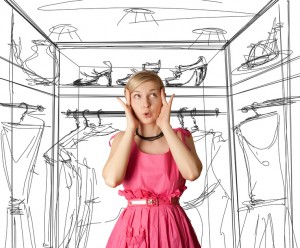
Time to declutter and organise your wardrobe?
Having decluttered the odd wardbrobe (or a hundred or so) for clients, I think I have got some good tips to offer. Not only can it act as a spring clean, but it can help you get ready for the spring racing season or the next season ahead of us.
I think wardrobe decluttering is something that should be done at least once a year. Did you know that on average, we wear 20% of our wardrobe 80% of the time? It’s amazing when I start asking clients – when was the last time your wore that outfit. The answer is always the same. So now is the time to start decluttering your wardrobe.
Here are some tips on how to declutter and organise your wardrobe:
Assign Some Time To Declutter
This kind of declutter job always takes longer than you think. You’re probably going to need at least half a day to organize your wardrobe.
Start Small
Don’t pull everything out of your wardrobe. You will be in a bigger mess than before you started and if you get called away by the kids or a phone call then you will have to deal with the big mess when you come back.
One Person’s Trash is Another’s Treasure
I love this one. Anything that is good and you know would make a friend happy, then wash, iron and give it to your friend. (Just remember to do this within 2 weeks of your declutter session, otherwise you will find it will never leave your house!).
Make Some Money Fom Your Decluttering
For items that are designer or vintage, you can sell them on eBay.
Donate Them
For general items, they can be donated to your local charity store.
Repair Items
For items that need to be altered, drop it off for repair (and ideally within 2 weeks) otherwise you will forget and it will become clutter again and make its way back into your wardrobe!
Haven’t Worn it The Last Year?
The say bye, bye…if you haven’t had it out in the last 12 months then throw it in the “ditch it” pile. Certain classic items (i.e. LBD,) are exempt.
Keep, Throw Out or Maybe?
Be as ruthless as you can. These are the rules:
- Anything that’s ripped, stained or worn needs must be thrown out.
- Things that don’t fit must be thrown out or put in the “maybe” pile. The same applies to anything that’s less than flattering.
Maybe? Maybe Not?
If you are indecisive you might have a huge maybe pile. Give all the items in this pile a second look using these rules:
- If it doesn’t fit right now, is it likely to fit anytime soon?
- If it needs cleaning or repairs, is it worth the cost? Then ask yourself, if you do get the repairs done will you wear it within the next 2 months? If not then perhaps it needs to go out.
- If you’re emotionally attached to the item and absolutely can’t bear to part with it, put it on the keep pile. This ‘get out of jail free’ card is valid for a couple of items only, so be selective.
Organize Your Wardrobe
Now once you have gone through your wardrobe, now it’s time to put everything pack and organise it neatly. But first, give your wardrobe a quick wipe out remove and put away everything that doesn’t belong.
Organize your wardrobe with the clothing grouped by type or colour using good hangers and shoe trees and folding all non-hanging garments neatly. Leave a space between everything if you can as it helps with the tidy, ‘minimalist’ look.
Wardrobe Storage Product
You can buy some great storage product to help you keep your wardrobe organised. Ikea have some great fabric dividers that you can store all your underwear and socks in. There are also some good coat hangers that you can use to create more room in your wardrobe. Felt covered hangers are perfect for silk tops and items that are inclined to slip off standard coat hangers.
If you need some help organizing your wardrobe, then contact us at The Lifestylers Group, as we love organizing wardrobes.
Until next time, happy organising.
Natalie Morey, Professional Organiser.
by Natalie Morey | Oct 1, 2012 | Declutter tips, Home Organisation, Tips
Declutter to Downsize
Are you moving house? Are you downsizing. You may be in the situation that you just cannot take everything when you move so some things will need to go. So now is the perfect time to start the decluttering process, ready for your downsized home.
If you declutter early, the move will go so much smother. You won’t arrive at the new house with a ton on boxes that just won’t fit everywhere. You also won’t need to purchase additional storage for those excess items.
Here are some tips to help make the declutter and downsizing process easier.
Start Decluttering Early
Moving is stressful and emotions are high during this process. Take the time to carefully sort through your belongings early. As a professional organiser who has helped move hundreds and hundreds of clients, my number one tip is to start decluttering early. Don’t start the week before you move. I would recommend starting at least 3 months before you are going to move.
Don’t Forget to Downsize Your Kitchen
Moving to a smaller kitchen can be a challenge. Sometimes, just looking at the quantity of kitchen cabinets, appliances and dishes that you have will make you think downsizing is impossible. However, it is quite possible to move to a smaller home and a small kitchen and still have everything you need. As a professional organizer. We help many clients to do just that. It does take some organising and it takes time, but it can be done. For example, let’s say you have 8 coffee cups with your dinner set, 4 favourite mugs, several souvenir mugs and then theirs those other mugs that don’t match anything and just seem to accumulate. You need to ask yourself ‘when was the last time you served coffee to 22 people?’ Get my point.
Keep Only One
Many common kitchen items often have duplicates. Purge down to one colander, one set of measuring cups, one spatula, one set of tongs, and so forth. You will be amazed at just how many duplicate items you have.
Keep wall hangings, pictures and knick-knacks minimal. Only keep your favourite ones.
Sell Your Stuff – Don’t throw anything in the garbage
Recycle, reuse, sell and donate instead. As tempting and easy as it is to pitch wire hangers, old clothes and furnishings, be environmentally responsible and find a home for everything.
- For a large number of items, you might consider having a garage sale.
- If you have time before the move, you can sell items on eBay.
- Used designer clothing can be resold in consignment shops. These stores can be found in your local business directory. Be sure to shop around though, some stores offer better rates than others.
- Donate items to the Salvo’s or your favorite charity store.
Declutter Every Cabinet, Shelf and Wardrobe
Only put back the things you couldn’t live well without. You might have to be ruthless but there is no point in keeping items that you cannot display at your new home.
Measure Your Furniture
You will need to know how your furniture will (or won’t) fit into your new space – particularly large items such as your sofa, sidetable and your bed – so measure everything. This will often determine which items will and won’t fit and which items you need to get rid of.
Assess Your New Storage Areas
How many times have you moved into a new place only to realize – too late – that you have overestimated the amount of storage space you actually have. While you’re getting room measurements, make sure you properly assess your new storage situation. Will you have fewer kitchen cupboards? If so, how many. Then think about your current home and the number of cupboards that you have. Often you only see your new home for 15 minutes at an open for inspection and you don’t think to take notes of these sorts of things. I don’t know how many times clients have told me “Oh the place has got lots of storage” only to get there and find it doesn’t. How many wardrobes will you have? How many hanging sections does the wardrobe have? Often clients get caught out on this one also.
When you are decluttering to downsize you have to be a bit more ruthless than a normal declutter. Start early your decluttering, plan ahead and tackle one room at a time.
Until next time, happy organsing.
Natalie Morey, Professional Organiser
by Natalie Morey | Sep 30, 2012 | Declutter tips, Home Office, Home Organisation, Tips
Find a Place for Every Item – It helps keep you organised
How often do you come inside and just dump your bag and “stuff” on the bench or dining room table. The mail, handbag, the kids’ stuff. It all just goes on the bench. Before long, it becomes known as the “official dumping ground”, full of clutter and stuff. It then becomes habit for everyone else to put their stuff their too. You need to have a place for every item and you need to get into the habit of putting the items in their correct place straight away. Don’t double handle items.
Get Some Home Organisation “Containers”
Buy some small clear plastic containers (with lids), and use them to create kits where you can store all the items you need for a particular task. For instance, you could create a shoeshine kit, a bill-paying kit (think In-tray) and a container for all your batteries and so on. That way, you can easily find the things you need to accomplish your everyday tasks. By keeping things grouped together and organised it will save you time as you won’t need to spend time searching for missing items.
Dump Duplicates – and rid yourself of clutter
Why have two nonstick spatulas when one is enough? Why have three hairbrushes or 3 colanders. Throwing out duplicates is one of the easiest ways to stop clutter. A good rule to apply is “one in, one out”. When you get something new, it’s the perfect opportunity to get rid of something old. Before you bring home that big new flat-screen TV, figure out what you’re going to do with the current TV you already have. Having done this recently, I was surprised at just how hard it was to donate my old TV. It worked perfectly and I really didn’t want to put it into land fill. Often finding an organisation that can benefit from your items is good for two reasons. Firstly, you know it’s going to a good home and secondly it’s not going into land fill so it’s easier to get rid of things knowing this. So if you want to be organised you need to clear the clutter first.
Lost Keys
Are you always wasting time looking for your keys. I have done this for lots of clients and they love it. Put a hook right inside your front door. Every time you come home you hang your keys on the hook. It might take you a bit to remember to put the keys there every time you come in, but in no time it will become habit and best of all, you will always know where your keys are. You can also get some lovely hooks, so it does not have to become an eye sore.
Write a “to- do- list”
In a recent blog article, I wrote about the benefits of writing a to-do list.
They help us stay organized, get the most out of our day and ensure we complete everything that needs to be done. Here are the key tips that I mentioned:
- Write a “to–do” list the night before.
- Once on paper, you can plan, prioritise and get a system in place for managing your day.
- Make it achievable.
- Stick to your list.
- Tick off tasks when they are completed.
- Don’t procrastinate and allow yourself to get side tracked.
- Be time specific when you are writing your list and make sure you have a time frame as to when your tasks must be completed by.
- Get into the habit of writing a list every day. Once you are in the habit, you are half way there.
Until next time, happy organising.
Natalie Morey, Professional Organiser.
by Natalie Morey | Sep 29, 2012 | Tips
Is Your Clutter Stressing You Out?
So often when I speak with clients they feel embarrassed about their home, their lounge room, their bedroom or their home office. No matter which room it is the comments are the same. Too often clients tell me that they don’t have friends over anymore as they are embarrassed about the state of their home.
It does not take long for clutter to build up on your kitchen bench tops, in the kid’s rooms and on your desk. But what causes clutter. Obviously, it is piles of things that are sitting around that should not be there. But there are some other reasons why clutter starts to build up.
What is Causing Your Clutter?
- You keep things around “just in case.” Our fear is that as soon as we get rid of something, the situation will arise where we need it.
- You don’t want to declutter because you feel guilty about getting rid of something that was given to you. Perhaps it was a gift, it was expensive or it was part of an inheritance.
- You continue to keep supplies or unfinished projects that were once important to you in the past, but they now do not have the same importance to you.
- Some people are visual people and they like to see things. They think that if it is out of sight it will be out of mind. They keep bills and invitations lying on surfaces or in a “safe” place. Soon these are covered by the next layer of items too important to put away. Does this sound familiar to you?
- Now, I see this one all the time when I am assisting clients to declutter their homes. Clients are waiting for an object to come back in fashion or they think it will become a valuable heirloom and they think that they could make some money. So instead of decluttering and clearing the space they keep the items. Then the clutter starts to build up again.
Do any of these clutter causing tips sound familiar to you?
I am here to assure you that you are not alone. In fact, there are many, many people just like you that have the same issue. Clients just don’t realise it.
We have been helping people since 2005 and now have a team of lovely professional organisers who specialise in specific areas including:
- Home office organising and decluttering
- Wardrobe and cupboard organising
- Kitchen organising
- Decluttering and home organising
- Interior design
- Decluttering and preparing houses for sale, and
- Garage organising.
So I would really love to reinforce to clients that you are not alone and that help is just a phone call away. Now is the time to get started and motivated and start decluttering and culling.
Perhaps it is time to write a “to-do” list and detail what areas of your home you want to start decluttering. I wrote about that in a previous blog: Get Organized: Write a To-Do List. Hopefully this might give you some tips on how to get started with your decluttering.
Remember, if you continue to do the same thing, you will continue to get the same result.
Until next time, happy organising.
Natalie Morey, Professional Organiser.
by Natalie Morey | Sep 28, 2012 | Declutter tips, Tips
How to Become Organized
As professional organisers, we love lists. They help us stay organized, get the most out of our day and ensure we complete everything that needs to be done. Here are a few handy tips to help you when organizing your “to-do list”.
Tips to Help You Get Organized
1. Write a “to–do” list the night before. The last job you should do before you finish for the day is to write your list for tomorrow. As soon as you clear the clutter in your head, you automatically feel more organised and less stressed. There is also nothing better than knowing that you are prepared for the next day. It saves you time in the morning and you can start off feeling organised. Best of all, you won’t wake up in the night, worrying about something. Remember, decluttering your mind is just as important as decluttering your physical space.
2. Once on paper, you can plan, prioritise and get a system in place for managing your day. Prioritising your list and working out which are the most important tasks to be done first, is really important because, let’s face it, often you won’t be able to tackle everything on your list at once.
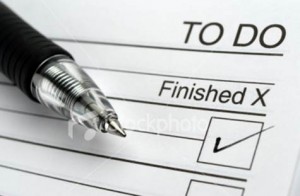
Get organised. Write a “to-do” list as it really helps you plan your day.
Make Your List Achievable
3. Make it achievable – don’t put too many tasks on your list which you know you will never get through. It becomes disheartening and you will start to feel unmotivated. There is nothing more rewarding when you can tick something off your list.
Stick To Your List
4. Stick to your list. Achieving everything on your list takes discipline. It is really important to stick to your list and make sure you complete what is on there before you start adding other things onto it. If something pops up, ask yourself is it a priority and does it need to be done today, and then decide if it goes on the list for today or tomorrow and also what priority it should have.
Completing Tasks On Your To-Do List
5. Tick off the tasks when they are completed. As I mentioned, there is nothing better and more rewarding when you look back at the end of the day and see everything is ticked off.
6. Don’t procrastinate and allow yourself to get side tracked. If you want a coffee, tell yourself that you can have one, once you have completed a task (or perhaps two) off your list.
7. Be time specific when you are writing your list and make sure you have a timeframe as to when your tasks must be completed by.
Getting organised and staying organised is all about changing your habits and carefully planning your day.
Until next time, happy organising.
Natalie Morey, Professional Organiser






